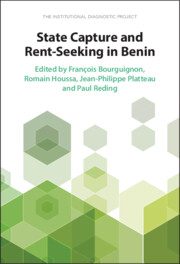Appendix 1 Growth Accounting
A straightforward exercise of growth accounting for Benin is performed in Table 2.A.1 over subperiods of ten years, starting in 1970.
Table 2.A.1 Growth accounting
| % per annum | 1970–1980 | 1980–1990 | 1990–2000 | 2000–2010 | 2010–2017 |
|---|---|---|---|---|---|
| Growth rates | |||||
| GDP | 2.69 | 3.23 | 4.62 | 3.87 | 4.57 |
| Labour (L) | 2.47 | 2.96 | 3.27 | 2.97 | 2.82 |
| GDP per capita | 0.22 | 0.27 | 1.35 | 0.90 | 1.75 |
| Capital (K) | 3.38 | 1.14 | 1.53 | 2.55 | 4.50 |
| K/L | 0.91 | –1.82 | –1.74 | –0.42 | 1.68 |
| GDP growth: contrib. of | |||||
| K | 1.32 | 0.45 | 0.60 | 0.99 | 1.76 |
| L | 1.51 | 1.81 | 1.99 | 1.81 | 1.72 |
| Total (K+L) | 2.83 | 2.25 | 2.59 | 2.81 | 3.48 |
| TFP | –0.14 | 0.98 | 2.03 | 1.06 | 1.09 |
| Labour productivity growth | 0.22 | 0.27 | 1.35 | 0.90 | 1.75 |
| of which due to K/L | 0.36 | –0.71 | –0.68 | –0.16 | 0.66 |
The following results stand out:
Growth of GDP per capita was subdued during the first two decades, but much more dynamic during the 1990–2000 period of economic reform, as the economy recovered from the 1980s crisis period. Growth in 2000–2010 slowed again, before picking up during the most recent period.
After rising in 1970–1980 – the period of heavy public investment under the socialist regime – the capital-to-labour ratio continuously decreased during the next thirty years, weighting negatively on labour productivity growth during these years. It is only in the most recent period that the ratio picked up again.
Total factor productivity (TFP) contributed positively to GDP growth during each subperiod, except during the socialist experience. From 1980 to 2010, TFP allowed labour productivity to grow despite the thirty-year decline in the capital-to-labour ratio. It is probably not a coincidence that the most significant contribution of TFP to growth occurred during the 1990s–2000s, the period during which structural adjustment and reforms were carried out. During the other subperiods, its contribution to growth is relatively constant, at about 1 per cent per annum.



